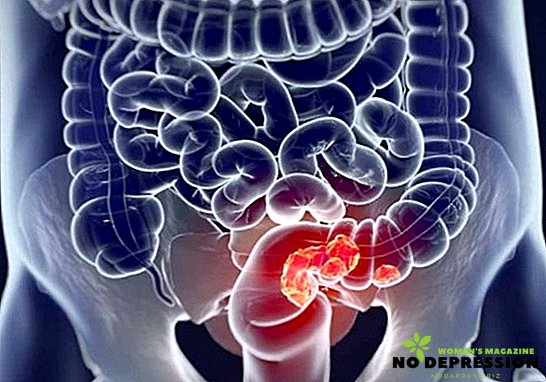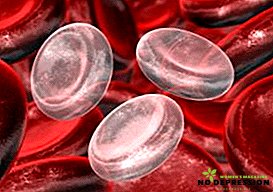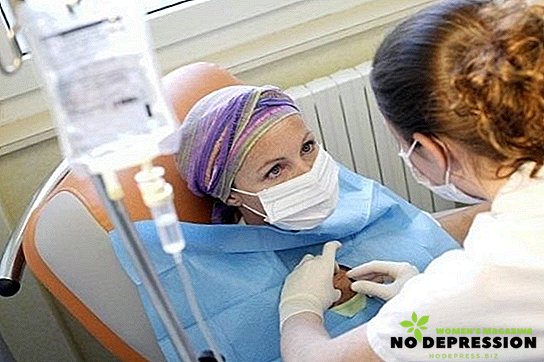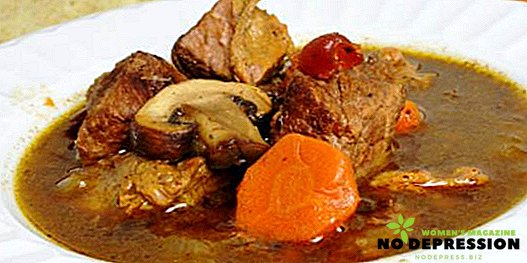Bowel cancer is characterized by the appearance of malignant neoplasms on the walls of the mucous membrane. According to statistics, this pathology ranks third among other cancers.

Causes of malignant tumors
In the first place is smoking. On the second - the peculiarities of nutrition and on the third - heredity.
Nutrition
The diet of the modern person is “rich” in food, but there is a shortage of coarse fiber, for example, whole grains, fresh plant food. This contributes to the appearance of constipation, a general increase in the time the food lump in the intestine. Some products are carcinogenic.
With prolonged contact with the mucous membrane, they provoke intestinal metaplasia. The abundance in the human diet of products with preservatives, emulsifiers, dyes can lead to the development of cancer processes in the gastrointestinal tract.
Diseases of the digestive tract
Polyps in the intestines, that is, benign formations, in 70% of cases become malignant. Doctors consider them to be the zero stage of oncology, because it is important to remove polyps.
Inflammatory processes and ulcers of the mucous membrane, Crohn's disease, and other gastrointestinal pathologies can provoke the formation of tumors. Celiac disease, that is, gluten intolerance, is also one of the factors for the development of oncology in the intestine.
Symptoms and signs of bowel cancer
For patients with oncology, early treatment is very important. Therefore, it is necessary to know the clinical picture of this pathology. The intensity of their manifestation, the frequency of occurrence depends on the location of the tumor and the stage of cancer. The disease can occur in several types, the symptoms of which are listed below.
Stenosis
Due to the growing tumor, the intestinal lumen narrows. Over time, cancer can completely block it, create a serious obstacle to the fecal mass. Clinically, this is expressed in constipation, intestinal colic, gas. The patient also suffers from pain and swelling after an act of defecation.
Enterocolitis
Often, neoplasms can provoke dilution of the intestinal contents, fermentation. Most often, the patient complains of loose stools, bouts of diarrhea, which can be replaced by prolonged constipation.
Dyspepsia
Early symptoms of this disease can be expressed in the appearance of heartburn, belching. The pain is absent or mild, but at the same time the person feels discomfort, indicating digestive problems.
Anemia
The reason for the development of anemia in intestinal cancer is a decrease in the absorption of microelements and vitamins. Also microcirculation, which occurs during the development of the tumor process, lowers the level of hemoglobin in the blood.
Anemia can result from a malfunction of the immune system. The body tries to fight the tumor on its own, tries a variety of options, and this is one of them.
Inflammation
There may be symptoms of an inflammatory process: fever, chills, may be nausea or vomiting. All this is accompanied by severe pain.
Cystitis
Often, the manifestation of a tumor in the intestines may, on the basis of signs, resemble the pathology of the organs of the genitourinary system, bloody streaks appear in the urine or on the clothes, pain is felt after urination.
Other symptoms:
- patients with a malignant tumor feel the fullness of the intestine, even after an act of defecation;
- some patients report dramatic weight loss even with good nutrition.
A tumor in the intestine may indicate the presence of blood in the feces.
Symptoms depending on the location
In the intestine there are several sections: the rectum, thick and thin. The predominance of a number of symptoms may indicate to the doctor where the cancer is located.
Signs of a tumor in the rectum
This is indicated by:
- False urge to empty.
- Discharge from the anus in the form of pus, mucus, and blood.
- Attacks of severe pain in the perineum area and a little higher may precede the bowel movement.
- When the structure of the rectum is damaged, there is an inability to retain gases or feces.
- General intoxication of the body, for example, headache, weakness, fatigue. Inflammatory processes can be a consequence of constipation and finding waste products in the intestinal cavity.
- Due to the proximity of the last section of the intestine and organs of the urogenital system, the neoplasm may affect the work of the latter, for example, is characterized by inflammation of the bladder or incontinence of urine.
Colon Cancer Symptoms
Tumors in the colon are manifested by symptoms such as:
- pain in the abdomen, especially in the subcostal area (often has a dull character);
- abdominal distention, discomfort;
- burning, diarrhea;
- intestinal obstruction, which is accompanied by acute pain, nausea and vomiting;
- accumulation of fluid in the abdominal cavity.
Signs of small bowel cancer
Cancer of the small intestine is most often manifested by dyspeptic symptoms:
- pain in any area of the abdomen;
- lack of appetite, aversion to food;
- bowel cramps, vomiting, nausea, taste change;
- possible staining of feces in a dark color in the presence of bleeding.
The doctor should alert any violation of the gastrointestinal tract, which does not pass after a diet and the normalization of nutrition. If symptoms persist, do not do without a thorough diagnosis.
How to identify a bowel tumor: diagnosis
Blood test
Changes in blood parameters in this disease occurs as follows: the number of red blood cells and hemoglobin decreases, the number of leukocytes increases.
There is an increased ESR. In the feces may be hidden blood. Increased coagulability. It is also desirable to pass tests for tumor markers.
Instrumental diagnostic methods
To clarify the diagnosis, they use all sorts of modern equipment. First of all:
- Colonoscopy or sigmoidoscopy. With the help of intra-intestinal sensors, the doctor will be able to see the condition of the mucous membrane and take a sample of suspicious tissue for examination. Such a method will identify the initial stages of development of a malignant tumor. Conducting planned research can significantly increase the patient's chances of successful treatment. It is possible to use a special intrarectal sensor and an ultrasound machine for examination.

- Irrigoscopy. If it is not possible (which happens most often for psychological reasons), an intra-intestinal examination is performed using barium X-rays or irrigoscopy. The gamming method introduces a special sensitive solution with a dye, through which you can detect bowel disease. The doctor may also resort to using an ultrasound machine or do a virtual colonoscopy.
- MRI and CT. It is possible to use these methods for a full examination of the surrounding tissues on the presence of metastasis.
Modern diagnostics will make it possible to accurately determine the location of the tumor, the size, stage of development, the degree of germination and other parameters that will allow the doctor to choose the most effective treatment strategy.
Features of treatment using different methods
Folk therapy
Traditional methods of cancer treatment will not get rid of this pathology - everyone needs to know that. Such tools will reduce the intensity of symptoms, but they do not affect the growth of malignant cells.
Modern medicine allows for the treatment of intestinal cancer, but it is important to know one condition: the disease must be detected at an early stage.
In the diagnosis of pathology in the later stages, only 50% of patients still have a chance of getting rid of the disease. This is bad, because now less than 25% of patients receive timely assistance, and more than 40,000 people die from bowel cancer in Russia every year.
Surgical methods
In the early stages of tumor development, it can be removed surgically with the restoration of the intestinal permeability. The body after this pathology fully performs its functions, retains the possibility of a natural act of defecation. Thus, after the operation, a person can exist as comfortably as possible.
The location of some foci of malignant cells does not allow the intestinal permeability to be restored. In this case, the free end of the intestine is brought out through the hole in the peritoneum. In the future, it is necessary to use disposable kalopriyemniki, which also allows you to maintain a relatively comfortable existence.
Radiation and chemotherapy
The use of these methods will prevent metastasis, suspend tumor growth for a long period. The technique is used in the postoperative period and in case of impossibility of performing a surgical operation.

Stages of the disease
At the moment, there are several stages of the pathology, each of which has its own symptoms.
- The first stage. It is diagnosed badly, has no symptoms. At this stage, the cancer is cured by 100%. The tumor does not recur.
- Second stage Education begins to grow rapidly, occupying more than 50% of the diameter of the intestinal lumen. The prognosis for recovery is optimistic, the treatment is carried out both single and complex.
- The third stage. Cancer spreads to the lymphatic system, signs are pronounced. At this stage, the tumor is poorly controlled, growing rapidly. May be accompanied by the appearance of metastases, which first penetrate the lymph, bloodstream, then move to neighboring systems and departments.
- Fourth stage. The size of the formation and the extent of the lesion are no longer so important, since the cancer cells have moved to the adjacent sections. Treatment at this stage is ineffective. The essence of therapy is to alleviate the physical condition of the patient, reduce symptoms and prolong life.
Life expectancy after treatment
How many people live after treatment of intestinal tumors? In medicine, there is the term "five-year survival." These are statistics that indicate the number of patients who have lived more than 5 years after the treatment. The indicator depends on a number of factors. First of all, the stage of cancer is affected, at which therapy began:
- the first stage - more than 95% live more than 5 years;
- the second stage is about 75%;
- third stage - about half of the patients live more than 5 years;
- fourth stage with the presence of metastasis - only 5% of patients live more than 5 years.
The influence is exerted by the patient's age, the level of immunity, concomitant diseases, the depth of penetration of pathogenic cells, relapses, the size of the tumor.
Preventive actions
Despite the fact that cancer tumors are extremely insidious, it is important for all people to pay attention to prevention, especially those who have a family history of cancer, have background pathologies.
To preventive measures include:
- lifestyle correction;
- increase physical activity
- meals should include foods that are rich in fiber;
- rejection of bad habits;
People who have reached the age of forty are advised to take 100 mg of Aspirin every day after meals. This will suppress the growth of some types of tumor cells, and start preventing the pathologies of the cardiovascular system. Every year, you must donate feces for blood particles.













